NZVA urges animal owners to help fight antibiotic resistance through preventative care
Animal owners can help protect life-saving antibiotics from resistant bacteria by keeping their animals healthy, says the New Zealand Veterinary Association.
 The report highlights there is inadequate funding of veterinary schools to meet the cost of teaching future vets.
The report highlights there is inadequate funding of veterinary schools to meet the cost of teaching future vets.
A new report into the education of veterinarians has revealed a sustainability crisis within the sector.
The Rethinking Veterinary Education report from Veterinary Schools of Australia and New Zealand, released last month, is the first such report into veterinary education in over 20 years. It details a series of factors, including the funding models of veterinary education, sustainability in domestic and agricultural practice, and retention of veterinarians in both urban and rural areas that could lead to a severe crisis.
New Zealand Veterinary Association (NZVA) president Kate Hill says the sector is facing a number of challenges currently.
“We’ve got a global veterinary shortage and then this review highlights the fact that, as well as the workforce shortage, we’ve got the increasing demand of veterinary services in New Zealand across the whole sector,” Hill told Rural News.
She says that, additionally, the report highlights there is inadequate funding of veterinary schools to meet the cost of teaching future vets.
The report states that veterinary courses are the most expensive professional courses for universities to deliver. It says that the funding per veterinary student to universities from government grants and student fees only covers approximately twothirds of the average estimated total delivery cost per student.
Additionally, it states that incremental opportunities to reduce costs have largely been exhausted and more strategic, structural reforms are required.
Hill says that compounding the cost of educating veterinary students is the salaries those students are then provided when they qualify.
“The veterinary salaries, once they’ve graduated, are becoming uncompetitive with other professions. Other professions have been increasing and the veterinary salaries haven’t been increasing as much,” she adds.
Hills says that building a new veterinary school will not solve the issues at all. “The ultimate change is to improve the education crisis and try and be graduating more veterinarians, have a well-funded university model and happy, healthy university staff and students and veterinarians.”
Pāmu has welcomed ten new apprentices into its 2026 intake, marking the second year of a scheme designed to equip the next generation of farmers with the skills, knowledge, and experience needed for a thriving career in agriculture.
One team with 43 head, including a contingent from Mid Canterbury, are reflecting on a stellar NZ DairyEvent.
Fonterra farmer shareholders have approved the mechanism for a $2/share capital return expected from the sale of its global consumer and associated businesses.
Trainees in the horticulture industry studying towards a certificate or diploma can now apply for Horticulture New Zealand's (HortNZ) 2026 Industry Training Scholarships programme.
OPINION: The first three Global Dairy Trade (GDT) auctions have been a morale booster for farmers.
Former Fonterra executive Alex Turnbull has been appointed CEO to lead all five Yili Oceania Business Division companies in New Zealand.

OPINION: Here w go: the election date is set for November 7 and the politicians are out of the gate…
OPINION: ECan data was released a few days ago showing Canterbury farmers have made “giant strides on environmental performance”.